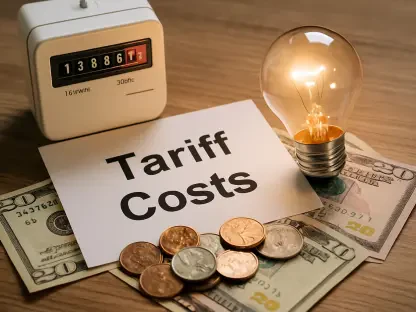In a world increasingly focused on financial transparency and security, the United Arab Emirates (UAE) stands at a pivotal crossroads, having transformed from a nation once criticized for lapses in financial integrity to a potential trailblazer in global reforms. This remarkable journey addresses critical issues like money laundering, terrorist financing, and proliferation financing—the illicit funding of weapons of mass destruction. With significant strides in regulatory overhaul and international recognition, the UAE is not just aiming to meet global standards but to redefine them. The question looms large: can this Middle Eastern powerhouse set a precedent not only for its region but for the entire world? This article delves into the UAE’s rapid evolution, examining the milestones achieved, the persistent challenges that test its resolve, and the broader implications of its efforts on both regional and global stages. The path forward is complex, but the stakes for financial governance worldwide are undeniably high.
A Remarkable Turnaround in Financial Governance
The UAE’s ascent in the realm of financial integrity marks a striking shift from past scrutiny to present-day acclaim. Having been removed from the Financial Action Task Force (FATF) gray list in early 2024, followed by a similar endorsement from the European Union in 2025, the nation has demonstrated an unwavering commitment to aligning with international benchmarks. This transformation is further highlighted by the UAE’s role as host of a landmark global financial governance roundtable in Abu Dhabi this year, uniting all nine FATF-Style Regional Bodies. Such initiatives reflect a strategic pivot from merely responding to criticism to actively shaping the discourse on financial regulations. This progress is not just about compliance; it signals an ambition to lead by example, positioning the UAE as a serious contender in the fight against financial crimes on a global scale.
Beyond these symbolic achievements, the UAE has taken concrete steps to address sophisticated threats like proliferation financing. The establishment of the Executive Office for Control and Non-Proliferation (EOCN) and the integration of cutting-edge data analytics in the 2025 National Risk Assessment (NRA) showcase a proactive stance. Yet, significant gaps remain evident. Over 60% of Designated Non-Financial Businesses and Professions (DNFBPs) lack tailored risk assessments for proliferation financing, while a mere 35% of Virtual Asset Service Providers (VASPs) have implemented robust controls. These shortcomings underscore that while the framework for reform is in place, its execution across diverse sectors needs strengthening to ensure comprehensive protection against financial misconduct.
Navigating Persistent Obstacles and Expert Perspectives
Despite the UAE’s impressive strides, sustaining these reforms presents formidable challenges that could undermine long-term success. Experts acknowledge the nation’s rapid progress, noting near-complete compliance with 39 of the 40 FATF Recommendations by 2024. However, they caution against overconfidence, pointing to vulnerabilities such as high-risk capital inflows from geopolitically sensitive areas like Russia. Additionally, inconsistent enforcement across free zones within the UAE raises concerns about the uniformity of regulatory oversight. With the FATF maintaining an “enhanced follow-up” status and a crucial evaluation scheduled for 2026, the pressure is on to demonstrate unwavering dedication. These hurdles suggest that while the foundation for reform is solid, its durability hinges on addressing these critical weaknesses with precision and consistency.
Expert insights further reveal a cautious optimism about the UAE’s trajectory in financial governance. While the scope and speed of reforms garner international praise, there is a consensus that the true measure of success lies in embedding these changes into the fabric of all sectors. The influx of high-risk capital remains a pressing issue, testing the resilience of the UAE’s regulatory systems. Moreover, the global landscape presents its own complexities, with systemic gaps in proliferation financing controls evident across many nations. The UAE’s ability to navigate these challenges will be pivotal in proving that its reforms are not just a temporary response to external pressure but a genuine shift toward sustainable integrity. This balance of achievement and caution shapes the ongoing narrative of the UAE’s role in global financial standards.
Regional Influence and Global Leadership Potential
The UAE’s advancements are creating a powerful ripple effect across the Middle East, prompting neighboring countries to elevate their own financial integrity measures. Nations like Bahrain and Saudi Arabia are accelerating reforms in anti-money laundering and counter-terrorism financing, often looking to the UAE as a benchmark for progress. This regional momentum is a testament to the UAE’s emerging influence, suggesting a potential reshaping of financial governance standards in the area. However, a lingering question remains about the driving force behind this change. Is it a deep-rooted commitment to institutional reform, or merely a reaction to the need for global compliance? The answer will determine whether the UAE’s model can inspire lasting transformation or risks being seen as a fleeting trend in the region.
On the global stage, the UAE aspires to be more than a compliant nation; it seeks to be a thought leader in financial integrity. This vision is articulated by figures like H.E. Khaled Balama, Governor of the Central Bank of the UAE, who emphasizes inclusive governance that incorporates regional perspectives into international frameworks. Yet, the broader context reveals significant challenges, as a 2025 FATF report indicates that only 16% of countries exhibit high effectiveness in targeted financial sanctions. These systemic vulnerabilities highlight the uphill battle the UAE faces in leading by example. If the nation can maintain its momentum and address both domestic and international gaps, it could redefine global standards, turning its journey into a blueprint for others navigating the intricate landscape of financial reform.
Building a Sustainable Future for Financial Integrity
Reflecting on the UAE’s path, it becomes evident that the nation has turned regulatory challenges into strategic opportunities over recent years. The shift from gray list status to hosting international forums in Abu Dhabi showcases a blend of compliance and ambition that few could have anticipated. This journey highlights not only the UAE’s influence on regional reforms but also its potential to impact global financial governance, despite lingering hurdles in enforcement and sector-specific readiness.
Looking ahead, the focus must shift to actionable steps that ensure lasting impact. Strengthening private sector compliance, particularly among DNFBPs and VASPs, emerges as a priority to close existing gaps. Harmonizing enforcement across all jurisdictions, including free zones, stands out as another critical need to build trust. As the world continues to grapple with high-risk capital and proliferation financing threats, fostering cross-border collaboration becomes essential. The UAE’s ability to institutionalize these reforms and drive a culture of integrity will ultimately define whether its leadership in this arena endures as a global standard.









